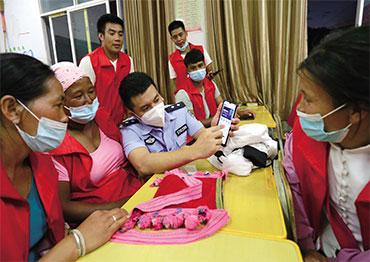Even if victims have been coerced or suckered into working in telecom fraud or other scams, they are still liable to be punished under Chinese law when they return. Mostly they receive a fine of several thousand yuan or a few days of detention.
“We can’t confirm exactly what they did in Myanmar,” Zhang said. Not everyone is as innocent as they claim, he said. Many knew exactly what job they were going to do. “They were lured by the high pay, but they obviously thought it was going to be an easy job, and didn’t realize they’d be abused for performing badly,” he said.
“The high pay is just an illusion. They can’t endure the huge gap between their perceptions and reality,” he added.
A Long agrees. “Minors and old people are mostly coerced into it, but many young people aren’t,” he said, adding some young people he saved admitted they did not think telecom fraud would be so hard to do.
Zhang said if police have enough evidence to prove that victims of the fraud gangs had committed crimes, they would be charged and punished.
But it is more important to prevent the crimes in the first place. In an article titled Cross-Border Cyber Crime of Chinese Citizens in Southeast Asian and Its Governance published in journal Southeast Asian Affairs in 2021, co-authors Zhuang Hua, an associate professor at Guangdong Police College and Ma Zhonghong, a professor at the People’s Public Security University of China, proposed ways to narrow the cyber-crime space by making comprehensive efforts to combat cybercrimes, improving international justice cooperation, strengthening border administration, and increasing clampdowns on the gray industrial chain related to cybercrimes.
Zhang said that the current rampant trafficking is partly due to the low penalties. This needs to be dealt with before the trafficking situation improves.
Social media and online platforms both serve as a means to warn people against scams as victims relate their experiences, and as ways to hook victims by advertising “high-paid jobs” in Myanmar.
“Online platforms should confirm the identity of each [scam] poster to help police track them and set up a complaint and reporting system for users to report illegal content,” Zhu Wei, deputy director of the Institute of Media Law, China University of Political Science and Law, told NewsChina. “But the platforms should be exempt from the responsibility for examining all the information. It is beyond their ability and may infringe on people’s right to speech,” he added.
Zhu emphasized that specialist sites like job recruitment platforms should be obliged to check the authenticity of the information published by employers.
“We have to reach a consensus in the international community that many crime organizations in northern Myanmar show characteristics of being cross-border gangs which should be a target for us to crack down on based on China’s Anti-Organized Crimes Law and The United Nations Convention against Transnational Organized Crime,” Jian told NewsChina. “We have to make joint efforts other than separate management among departments, and we have to ally with international efforts to root out cross-border gang culture to curb the crimes,” he added.
Jian suggested that police in border regions establish a system against cross-border organized crime with their counterparts in neighboring countries based on the Anti-Organized Crime Law. “We should make good use of the law to exchange information and cooperate with police in neighboring countries in a more flexible way,” he said.
Starting this year, China’s Ministry of Public Security (MPS) has strengthened cooperation. In March, the MPS, the National Police Bureau of the Republic of the Union of Myanmar and the National Police Bureau of Thailand held a meeting on human smuggling where the three parties proposed to crack down on cross-border crimes like human smuggling and telecom fraud. In June, six Chinese telecom fraud suspects were caught and sent back to China from Myanmar under escort.
Yet many parents are still waiting for news of their children trapped in Myanmar. They can do nothing but wait.
Li Dongmei is one such parent. Before she spoke with NewsChina, a 16-year-old boy who was coerced to Myanmar with her son was ransomed for 1 million yuan (US$138,370). But Li cannot afford such a sum. She told NewsChina that her trapped son is 19 and was raised by his grandparents after Li’s husband died of cancer 11 years ago, forcing Li to leave home to work.
Already in debt of around 1 million yuan (US$138,370) and having to support her younger son who is 15, Li said earning money is her top priority. She refuses to sell her house to ransom her elder son as some relatives suggest. “I can’t ruin my life, nor my younger son’s. I have to support my younger son’s education,” she said. As for the elder son, Li said she can only wait for good news. “It’s his fate,” she said.
In mid-May, Li’s elder son sent her a message, pleading with her to save him, but Li said she could not afford it. Li’s elder son has not contacted her since.

 Old Version
Old Version




